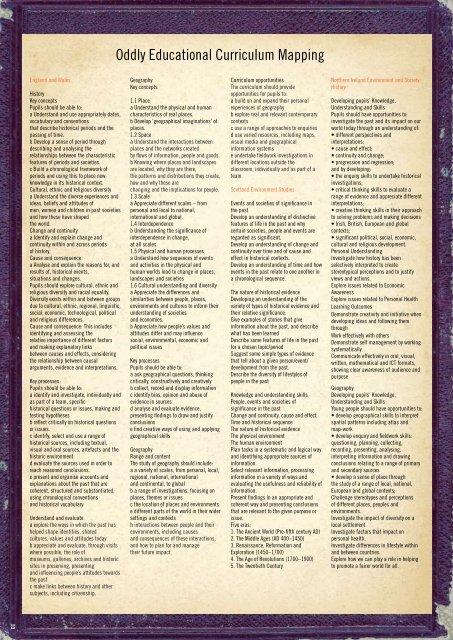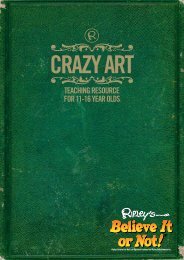Curious Cultures - Ripley's Believe It or Not!
Curious Cultures - Ripley's Believe It or Not!
Curious Cultures - Ripley's Believe It or Not!
You also want an ePaper? Increase the reach of your titles
YUMPU automatically turns print PDFs into web optimized ePapers that Google loves.
CC<br />
England and Wales<br />
Hist<strong>or</strong>y<br />
Key concepts<br />
Pupils should be able to:<br />
a Understand and use appropriately dates,<br />
vocabulary and conventions<br />
that describe hist<strong>or</strong>ical periods and the<br />
passing of time.<br />
b Develop a sense of period through<br />
describing and analysing the<br />
relationships between the characteristic<br />
features of periods and societies.<br />
c Build a chronological framew<strong>or</strong>k of<br />
periods and using this to place new<br />
knowledge in its hist<strong>or</strong>ical context.<br />
Cultural, ethnic and religious diversity<br />
a Understand the diverse experiences and<br />
ideas, beliefs and attitudes of<br />
men, women and children in past societies<br />
and how these have shaped<br />
the w<strong>or</strong>ld.<br />
Change and continuity<br />
a Identify and explain change and<br />
continuity within and across periods<br />
of hist<strong>or</strong>y.<br />
Cause and consequence<br />
a Analyse and explain the reasons f<strong>or</strong>, and<br />
results of, hist<strong>or</strong>ical events,<br />
situations and changes.<br />
Pupils should expl<strong>or</strong>e cultural, ethnic and<br />
religious diversity and racial equality.<br />
Diversity exists within and between groups<br />
due to cultural, ethnic, regional, linguistic,<br />
social, economic, technological, political<br />
and religious differences.<br />
Cause and consequence: This includes<br />
identifying and assessing the<br />
relative imp<strong>or</strong>tance of different fact<strong>or</strong>s<br />
and making explanat<strong>or</strong>y links<br />
between causes and effects, considering<br />
the relationship between causal<br />
arguments, evidence and interpretations.<br />
Key processes<br />
Pupils should be able to:<br />
a identify and investigate, individually and<br />
as part of a team, specific<br />
hist<strong>or</strong>ical questions <strong>or</strong> issues, making and<br />
testing hypotheses<br />
b reflect critically on hist<strong>or</strong>ical questions<br />
<strong>or</strong> issues.<br />
c identify, select and use a range of<br />
hist<strong>or</strong>ical sources, including textual,<br />
visual and <strong>or</strong>al sources, artefacts and the<br />
hist<strong>or</strong>ic environment<br />
d evaluate the sources used in <strong>or</strong>der to<br />
reach reasoned conclusions.<br />
e present and <strong>or</strong>ganise accounts and<br />
explanations about the past that are<br />
coherent, structured and substantiated,<br />
using chronological conventions<br />
and hist<strong>or</strong>ical vocabulary<br />
Understand and evaluate<br />
a expl<strong>or</strong>e the ways in which the past has<br />
helped shape identities, shared<br />
cultures, values and attitudes today<br />
b appreciate and evaluate, through visits<br />
where possible, the role of<br />
museums, galleries, archives and hist<strong>or</strong>ic<br />
sites in preserving, presenting<br />
and influencing people’s attitudes towards<br />
the past<br />
c make links between hist<strong>or</strong>y and other<br />
subjects, including citizenship.<br />
Oddly Educational Curriculum Mapping<br />
Geography<br />
Key concepts<br />
1.1 Place<br />
a Understand the physical and human<br />
characteristics of real places.<br />
b Develop ‘geographical imaginations’ of<br />
places.<br />
1.2 Space<br />
a Understand the interactions between<br />
places and the netw<strong>or</strong>ks created<br />
by flows of inf<strong>or</strong>mation, people and goods.<br />
b Knowing where places and landscapes<br />
are located, why they are there,<br />
the patterns and distributions they create,<br />
how and why these are<br />
changing and the implications f<strong>or</strong> people.<br />
1.3 Scale<br />
a Appreciate different scales – from<br />
personal and local to national,<br />
international and global.<br />
1.4 Interdependence<br />
b Understanding the significance of<br />
interdependence in change,<br />
at all scales.<br />
1.5 Physical and human processes<br />
a Understand how sequences of events<br />
and activities in the physical and<br />
human w<strong>or</strong>lds lead to change in places,<br />
landscapes and societies<br />
1.6 Cultural understanding and diversity<br />
a Appreciate the differences and<br />
similarities between people, places,<br />
environments and cultures to inf<strong>or</strong>m their<br />
understanding of societies<br />
and economies.<br />
b Appreciate how people’s values and<br />
attitudes differ and may influence<br />
social, environmental, economic and<br />
political issues<br />
Key processes<br />
Pupils should be able to:<br />
a ask geographical questions, thinking<br />
critically, constructively and creatively<br />
b collect, rec<strong>or</strong>d and display inf<strong>or</strong>mation<br />
c identify bias, opinion and abuse of<br />
evidence in sources<br />
d analyse and evaluate evidence,<br />
presenting findings to draw and justify<br />
conclusions<br />
e find creative ways of using and applying<br />
geographical skills<br />
Geography<br />
Range and content<br />
The study of geography should include:<br />
a a variety of scales, from personal, local,<br />
regional, national, international<br />
and continental, to global<br />
b a range of investigations, focusing on<br />
places, themes <strong>or</strong> issues<br />
c the location of places and environments<br />
e different parts of the w<strong>or</strong>ld in their wider<br />
settings and contexts<br />
h interactions between people and their<br />
environments, including causes<br />
and consequences of these interactions,<br />
and how to plan f<strong>or</strong> and manage<br />
their future impact.<br />
Curriculum opp<strong>or</strong>tunities<br />
The curriculum should provide<br />
opp<strong>or</strong>tunities f<strong>or</strong> pupils to:<br />
a build on and expand their personal<br />
experiences of geography<br />
b expl<strong>or</strong>e real and relevant contemp<strong>or</strong>ary<br />
contexts<br />
c use a range of approaches to enquiries<br />
d use varied resources, including maps,<br />
visual media and geographical<br />
inf<strong>or</strong>mation systems<br />
e undertake fieldw<strong>or</strong>k investigations in<br />
different locations outside the<br />
classroom, individually and as part of a<br />
team<br />
Scotland Environment Studies<br />
Events and societies of significance in<br />
the past<br />
Develop an understanding of distinctive<br />
features of life in the past and why<br />
certain societies, people and events are<br />
regarded as significant.<br />
Develop an understanding of change and<br />
continuity over time and of cause and<br />
effect in hist<strong>or</strong>ical contexts.<br />
Develop an understanding of time and how<br />
events in the past relate to one another in<br />
a chronological sequence.<br />
The nature of hist<strong>or</strong>ical evidence<br />
Developing an understanding of the<br />
variety of types of hist<strong>or</strong>ical evidence and<br />
their relative significance.<br />
Give examples of st<strong>or</strong>ies that give<br />
inf<strong>or</strong>mation about the past, and describe<br />
what has been learned<br />
Describe some features of life in the past<br />
f<strong>or</strong> a chosen topic/period<br />
Suggest some simple types of evidence<br />
that tell about a given person/event/<br />
development from the past.<br />
Describe the diversity of lifestyles of<br />
people in the past<br />
Knowledge and understanding skills<br />
People, events and societies of<br />
significance in the past<br />
Change and continuity, cause and effect<br />
Time and hist<strong>or</strong>ical sequence<br />
The nature of hist<strong>or</strong>ical evidence<br />
The physical environment<br />
The human environment<br />
Plan tasks in a systematic and logical way<br />
and identifying appropriate sources of<br />
inf<strong>or</strong>mation.<br />
Select relevant inf<strong>or</strong>mation, processing<br />
inf<strong>or</strong>mation in a variety of ways and<br />
evaluating the usefulness and reliability of<br />
inf<strong>or</strong>mation.<br />
Present findings in an appropriate and<br />
coherent way and presenting conclusions<br />
that are relevant to the given purpose <strong>or</strong><br />
issue.<br />
Five eras:<br />
1. The Ancient W<strong>or</strong>ld (Pre-fifth century AD)<br />
2. The Middle Ages (AD 400–1450)<br />
3. Renaissance, Ref<strong>or</strong>mation and<br />
Expl<strong>or</strong>ation (1450–1700)<br />
4. The Age of Revolutions (1700–1900)<br />
5. The Twentieth Century<br />
N<strong>or</strong>thern Ireland Environment and Society<br />
Hist<strong>or</strong>y<br />
Developing pupils’ Knowledge,<br />
Understanding and Skills<br />
Pupils should have opp<strong>or</strong>tunities to:<br />
investigate the past and its impact on our<br />
w<strong>or</strong>ld today through an understanding of:<br />
• different perspectives and<br />
interpretations;<br />
• cause and effect;<br />
• continuity and change;<br />
• progression and regression;<br />
and by developing:<br />
• the enquiry skills to undertake hist<strong>or</strong>ical<br />
investigations;<br />
• critical thinking skills to evaluate a<br />
range of evidence and appreciate different<br />
interpretations;<br />
• creative thinking skills in their approach<br />
to solving problems and making decisions<br />
• Irish, British, European and global<br />
contexts;<br />
• significant political, social, economic,<br />
cultural and religious development.<br />
Personal Understanding<br />
Investigate how hist<strong>or</strong>y has been<br />
selectively interpreted to create<br />
stereotypical perceptions and to justify<br />
views and actions.<br />
Expl<strong>or</strong>e issues related to Economic<br />
Awareness<br />
Expl<strong>or</strong>e issues related to Personal Health<br />
Learning Outcomes<br />
Demonstrate creativity and initiative when<br />
developing ideas and following them<br />
through<br />
W<strong>or</strong>k effectively with others<br />
Demonstrate self management by w<strong>or</strong>king<br />
systematically<br />
Communicate effectively in <strong>or</strong>al, visual,<br />
written, mathematical and ICT f<strong>or</strong>mats,<br />
showing clear awareness of audience and<br />
purpose<br />
Geography<br />
Developing pupils’ Knowledge,<br />
Understanding and Skills<br />
Young people should have opp<strong>or</strong>tunities to:<br />
• develop geographical skills to interpret<br />
spatial patterns including atlas and<br />
map-w<strong>or</strong>k<br />
• develop enquiry and fieldw<strong>or</strong>k skills:<br />
questioning, planning, collecting,<br />
rec<strong>or</strong>ding, presenting, analysing,<br />
interpreting inf<strong>or</strong>mation and drawing<br />
conclusions relating to a range of primary<br />
and secondary sources<br />
• develop a sense of place through<br />
the study of a range of local, national,<br />
European and global contexts;<br />
Challenge stereotypes and perceptions<br />
of different places, peoples and<br />
environments.<br />
Investigate the impact of diversity on a<br />
local settlement.<br />
Investigate fact<strong>or</strong>s that impact on<br />
personal health.<br />
Investigate differences in lifestyle within<br />
and between countries.<br />
Expl<strong>or</strong>e how we can play a role in helping<br />
to promote a fairer w<strong>or</strong>ld f<strong>or</strong> all.



